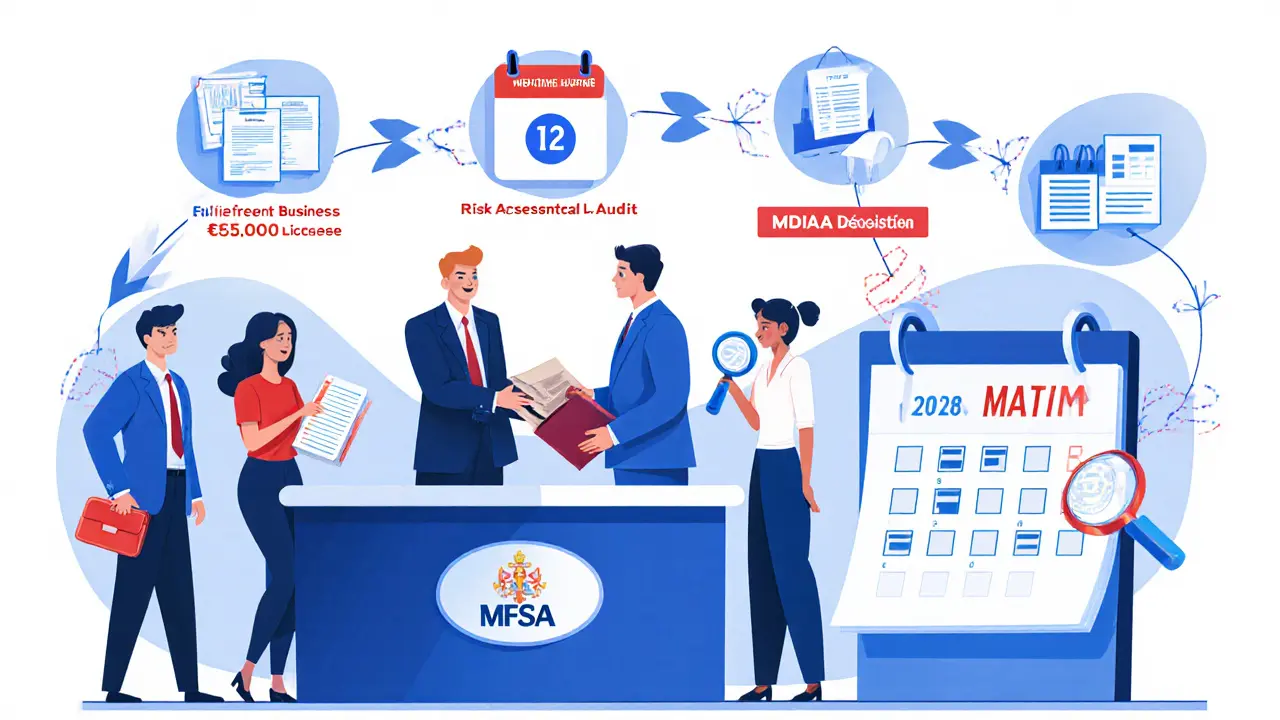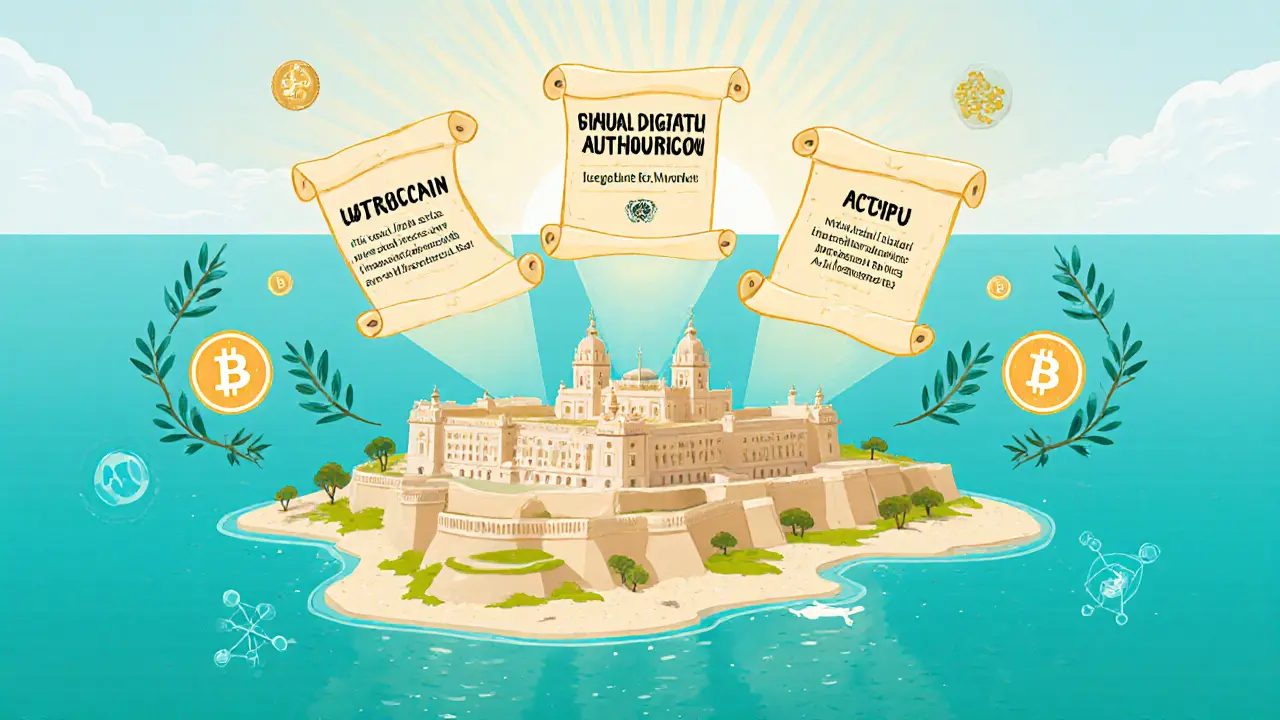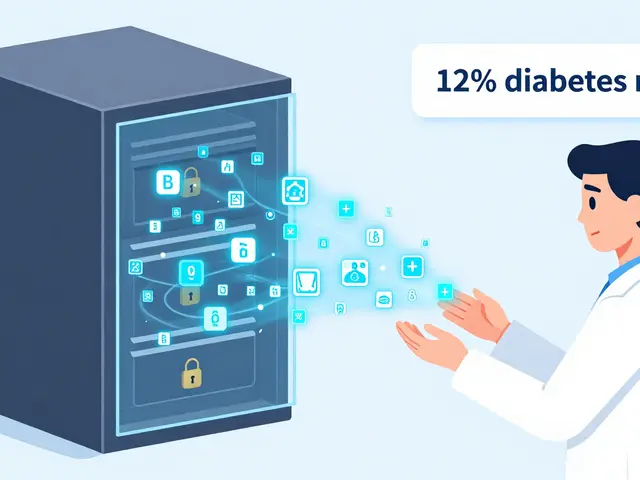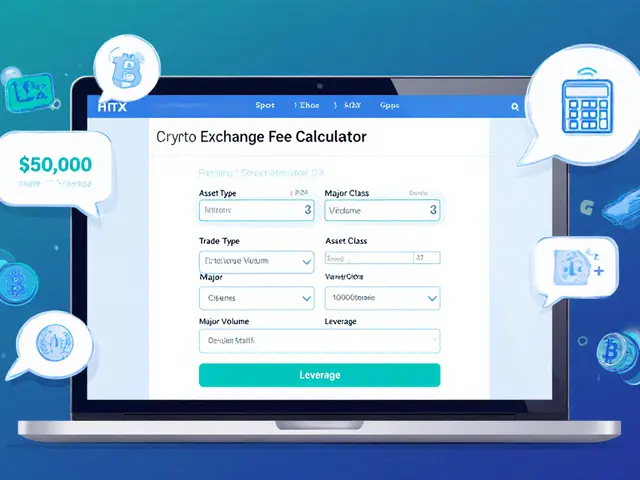Malta Crypto Tax Calculator
Calculate your effective corporate tax rate using Malta's imputation credit system. Input your business details to see how the tax benefit works for crypto businesses in Malta.
Results will appear here after calculation
How Malta's System Works: Malta's 35% corporate tax rate is reduced through the imputation credit system. Shareholders receive a tax credit equal to 6/7 of the corporate tax paid, which can lower the effective tax rate to as low as 0-5% for qualifying businesses.
Key Takeaways
- Malta’s three blockchain bills create one of the world’s most transparent crypto regulatory frameworks.
- No capital‑gains tax on long‑term crypto holdings; corporate tax can drop to as low as 0‑5% through imputation credits.
- The MFSA oversees licensing, while EU MiCA alignment tightens consumer‑protection rules.
- Residency programmes (GRP, MPRP) give investors tax‑friendly status and global mobility.
- Compared to Estonia or Gibraltar, Malta offers lower effective tax rates and EU market access.
When Malta announced its Blockchain Island Strategy a coordinated plan that combines legislation, tax incentives, and government support to attract crypto‑related firms, the world took notice. Malta blockchain island quickly became a buzzword for anyone looking to set up a crypto exchange, token project, or blockchain startup in a jurisdiction that actually understands the technology. Below is a step‑by‑step look at how the strategy works, what benefits it delivers, and where the still‑pending restrictions lie.
What the Strategy Actually Is
The strategy rests on three pillars launched on 4July2018: the Virtual Financial Assets Act, the Malta Digital Innovation Authority Act, and the Financial Services Act amendments. Together they form a “sandbox‑style” legal environment that defines what a virtual financial asset (VFA) is, how an initial coin offering (ICO) is evaluated, and which body issues licences. The MFSA (Malta Financial Services Authority) is the chief regulator, while the Malta Digital Innovation Authority (MDIA) handles technology standards and innovation grants.
Regulatory Framework - How Licensing Works
The MFSA requires every crypto‑service provider (CASP) to obtain a licence under one of three categories: Virtual Financial Asset Service Provider (VFA‑SP), Crypto‑Asset Exchange, or Crypto‑Asset Custodian. In 2025 the MFSA released a circular specifically for CASPs that are already authorised under the EU’s Markets in Crypto‑Assets (MiCA) regulation, tightening reporting and consumer‑protection standards. The licensing process typically follows these steps:
- Prepare a detailed business plan that maps out tokenomics, AML/KYC procedures, and IT security controls.
- Submit the application to the MFSA with a €50,000 non‑refundable fee.
- Undergo a risk‑assessment audit by an MFSA‑approved auditor.
- Receive a provisional licence (valid 12months) while the full compliance review is completed.
- Achieve full licence status and register with the MDIA for any blockchain‑specific tech grants.
Compliance is monitored continuously; the MFSA conducts quarterly reporting checks and may levy fines for breaches of the four core pillars: consumer protection, market integrity, financial stability, and transparency.

Tax Advantages - Why the Numbers Matter
Tax is often the decisive factor for crypto entrepreneurs. Malta treats long‑term crypto holdings as a “store of value,” meaning capital‑gains tax is zero as long as the assets aren’t part of a trading business. For active trading, profits are taxed as ordinary income at rates ranging from 15% to 35%.
Corporate entities that trade crypto face a headline 35% corporate tax, but the imputation credit system can reduce the effective rate to 0‑5% after a tax refund is processed. The system works like this:
- Profits are taxed at 35%.
- Shareholders receive a tax credit equal to 6/7 of the corporate tax paid.
- When shareholders file personal returns, they can claim a refund that drops the net tax to as low as 0%.
For non‑resident investors, the Global Residence Programme (GRP) offers a flat 15% tax on foreign income remitted to Malta, with a minimum annual tax bill of €15,000. This makes Malta attractive for high‑net‑worth individuals who earn crypto income abroad but want to enjoy a predictable tax rate.
Residency and Citizenship - Adding Mobility
Two government initiatives specifically target crypto wealth:
- Global Residence Programme (GRP) - grants tax‑residency after 183days of stay and a minimum property investment of €275,000.
- Malta Permanent Residence Programme (MPRP) - offers indefinite residence when applicants meet financial, property, and compliance thresholds.
Both routes give visa‑free access to over 180 countries, a crucial perk for crypto investors who travel frequently for conferences and networking.
How Malta Stacks Up Against Other Crypto‑Friendly Jurisdictions
| Jurisdiction | Regulatory Body | Licence Types | Corporate Tax (effective) | Capital‑Gains Tax |
|---|---|---|---|---|
| Malta | MFSA & MDIA | VFA‑SP, Exchange, Custodian | 0‑5% (via imputation) | 0% (long‑term holdings) |
| Estonia | Finantsinspektsioon | Virtual Currency Service Provider | 20% (flat corporate) | 20% (treated as income) |
| Gibraltar | Gibraltar Financial Services Commission | Distributed Ledger Technology (DLT) licence | 10% (standard corporate) - no imputation | 10% (if realised as income) |
The table shows why many businesses prefer Malta: lower effective tax rates, zero capital‑gains tax on passive holdings, and a regulatory regime that aligns with EU MiCA standards.

Step‑by‑Step Checklist for Setting Up a Crypto Business in Malta
- Choose the appropriate licence category (VFA‑SP, Exchange, or Custodian).
- Draft a business plan covering tokenomics, AML/KYC, and IT security.
- Engage a local law firm familiar with the three blockchain bills.
- Submit the licence application to the MFSA with the €50,000 fee.
- Open a corporate bank account - Maltese banks now have dedicated crypto‑service desks.
- Register for the Global Residence Programme if you need personal tax residency.
- Implement MiCA‑compatible reporting tools (e.g., blockchain analytics for transaction monitoring).
- Apply for any MDIA innovation grant that matches your tech stack.
- Conduct the MFSA quarterly compliance review.
- Plan for tax filing - work with a Maltese tax adviser to claim imputation credits.
Following this checklist can shave months off the setup time and keep you on the right side of both local and EU regulators.
Current Restrictions and Potential Pitfalls
Despite its friendly image, Malta still imposes a few constraints that businesses must respect:
- Crypto‑to‑crypto transaction rules - the 2025 amendment draft requires reporting of any swap that results in a change of token classification (utility ↔ security).
- Banking access - while crypto‑friendly banks exist, they may demand higher collateral and stricter AML documentation.
- MiCA alignment - once full EU MiCA rules kick in, some licence categories may be merged, requiring existing licence holders to re‑apply.
- Residency thresholds - the GRP and MPRP need minimum property investment and proof of legitimate crypto‑derived wealth, which can delay the process.
Being aware of these limits early helps you budget time and money for compliance upgrades.
Future Outlook - What’s Next for Malta’s Crypto Ecosystem?
The government has signaled two major moves for 2026:
- Introducing tax credits for “long‑term staking” - profits earned from staking assets held over 12months could become tax‑free.
- Launching a national blockchain sandbox under the MDIA, offering up to €2million in grant funding for startups that meet ESG criteria.
Both initiatives aim to keep Malta ahead of the curve as other EU members tighten crypto rules. For businesses, the message is clear: stay compliant, leverage the tax benefits, and watch for new incentives that could further lower operational costs.
Frequently Asked Questions
Do I need to be a Maltese citizen to get a crypto licence?
No. The MFSA only requires that the company be registered in Malta and that at least one director is a resident. Many firms appoint a local corporate service provider to meet the residency requirement.
How long does the licensing process take?
Typical timelines are 3-4months for a provisional licence and an additional 2-3months for full approval, assuming all documentation is complete.
What is the effective corporate tax rate for a crypto trading company?
The statutory rate is 35%, but the imputation credit system can bring the net rate down to 0‑5% after the shareholder tax credit is applied.
Can I claim capital‑gains tax exemption on crypto earned abroad?
Yes, if the assets are held as a store of value and you are not engaged in a trading business. The gains are treated as capital gains and are tax‑free under Maltese law.
Is MiCA compliance mandatory for Malta‑based exchanges?
From 2025 onward, any exchange that serves EU customers must meet MiCA standards. Malta has already aligned its licensing framework, so a local licence automatically satisfies most MiCA requirements.



 Finance
Finance





Luke L
October 15, 2025 AT 08:17The Malta scheme looks like another tax dodge for crypto firms, but it’s just playing with EU rules.
Ben Johnson
October 16, 2025 AT 09:33Oh, because nothing says “innovation” like a spreadsheet that pretends to be a crystal ball for tax. Got it.
Jason Clark
October 17, 2025 AT 14:43Malta’s imputation credit system essentially lets shareholders claim back six‑sevenths of the corporate tax, which can reduce the effective rate to near‑zero for qualifying entities. In practice, this means a company paying €1 million in profit might end up owing as little as €50 k after credit distribution. It’s a clever use of EU tax law, albeit one that hinges on strict residency and substance requirements.
DeAnna Greenhaw
October 18, 2025 AT 17:06In the annals of financial engineering, Malta’s approach stands as a paragon of legislative sophistication, deftly intertwining corporate tax obligations with shareholder entitlements to engender a fiscal environment wherein the ostensibly burdensome 35% rate is transmogrified into a negligible levy for duly qualified enterprises. One must appreciate the intricate ballet of imputation credits, which function as a conduit for returning a substantive portion of tax to the equity holders, thereby cultivating an ecosystem that is both alluring to external capital and reflective of a judicious regulatory paradigm. Yet, this very elegance begets a labyrinthine compliance landscape, wherein the requisite proof of economic substance, resident directors, and substantive operational presence may pose formidable challenges to the uninitiated. It is, therefore, incumbent upon any prospective entrant to navigate these statutory intricacies with meticulous diligence, lest the allure of fiscal expediency be eclipsed by inadvertent contraventions. In summation, Malta’s model is both a testament to strategic tax policy and a cautionary tale of regulatory exactitude.
Steve Cabe
October 18, 2025 AT 18:30While the theatrical prose is impressive, the reality is that Malta’s incentives are nothing more than a clever re‑branding of what any low‑tax jurisdiction can offer if you’re willing to plant a paper office there.
shirley morales
October 19, 2025 AT 20:53One should not be fooled by glossy marketing; ethical business practices demand transparency beyond tax optimisation.
Mandy Hawks
October 19, 2025 AT 22:16Nice concept.
Scott G
October 19, 2025 AT 23:40I appreciate the clear breakdown, though I would add that companies must also consider the administrative overhead of filing for the credit, which can be non‑trivial.
VEL MURUGAN
October 21, 2025 AT 00:40The calculator is a useful tool, but users should remember that the actual effective tax rate depends heavily on the classification of the business as active or passive, as well as the residency status of the shareholders.
Russel Sayson
October 22, 2025 AT 04:26Malta’s “Blockchain Island” branding is a straight‑up marketing stunt that tries to sell tax cheapness as innovation.
The 35% headline tax looks scary until you remember the imputation credit can whisk most of it away.
In theory, a crypto exchange that qualifies can pay as little as 5% after the credit, which is a sweet deal for any startup.
However, qualifying isn’t a walk in Valletta; you need a real office, Maltese directors, and a bona fide staff presence.
The substance requirements have been tightened after EU pressure, so you can’t just register a shell and call it a day.
On the upside, Malta offers a clear legal framework for virtual assets, which many other jurisdictions still lack.
The regulator, the MFSA, has published guidance that helps businesses understand AML obligations and licensing.
Still, the compliance costs-legal, accounting, and licensing-can chew up a sizable chunk of your profit.
Moreover, the credit claim process involves detailed calculations and approvals that may take months.
If you’re a non‑resident investor, you’ll also face withholding tax considerations on dividends repatriated to your home country.
The tax calculator on the site is handy for ball‑park figures, but it’s no substitute for a professional tax advisor.
Many firms set up in Malta only to later relocate when the EU’s anti‑tax‑avoidance rules become stricter.
That said, for a project that truly needs a European base and wants regulatory clarity, Malta can be a solid choice.
The key is to weigh the lower effective tax against the higher operational and compliance overhead.
In short, Malta isn’t a free‑ride; it’s a calculated gamble that pays off if you commit the necessary resources.
Bottom line: do the math, read the fine print, and decide if the “island” vibe matches your business roadmap.
Matthew Homewood
October 22, 2025 AT 05:50That extensive rundown underscores the importance of viewing tax incentives as part of a broader strategic plan rather than a standalone lure.
Mitch Graci
October 23, 2025 AT 08:13Wow!!! Malta really *re‑invented* corporate tax, huh? 😂
Jazmin Duthie
October 24, 2025 AT 12:00Sure, because tax havens are the new black.